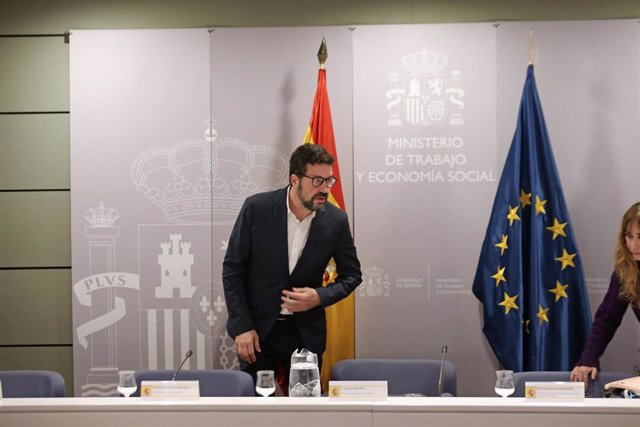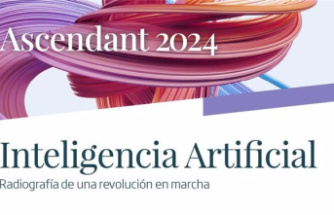The Government wants to "toughen" the sanctions of the LISOS to dissuade companies from failing to comply with the legislation on working time
The Ministry of Labor has accepted the demand that unions and employers have made to it in the first meeting of the social dialogue table that addresses the reduction of working hours to work in a bipartite manner in this matter, while maintaining in parallel the negotiations of both parties with the Government.
"The Government accepts this bipartite dialogue and encourages it. We are going to ask them to advance in this bipartite dialogue, but, naturally, the Government will walk in parallel with the social partners, convening them in the coming weeks to see what the progress of this dialogue is. bipartite and how we are moving forward in this line of achieving in 2025 the objective of the coalition program, which is to reach 37.5 hours in 2025," said the Secretary of State for Labor, Joaquín Pérez Rey.
After concluding the meeting with the negotiators of CCOO, UGT, CEOE and Cepyme that begins the work to reduce the working day in Spain, a fact that Pérez Rey has described as "historic" after four decades maintaining the weekly working day 40 hours, the Secretary of State has stressed that this first meeting has taken place in an "absolutely constructive" climate.
In this meeting, he stressed, the Government has made clear what its "final objectives" are in this negotiation: improve the effectiveness of time registration and reduce the weekly working day to 37.5 hours per week by 2025, as stated. in the PSOE and Sumar government program.
"Our objectives are for the time record to be an effective instrument that allows the Labor Inspection to act in a forceful and practical manner in those sectors where non-compliance occurs and to achieve this reduction of the working day to 37.5 hours in 2025. The path that We have to go together to achieve these objectives, which is precisely the work that the social dialogue table is going to do and that bipartite dialogue is also going to do," Pérez Rey assured.
Along the same lines, the negotiators of CCOO and UGT, Mari Cruz Vicente and Fernando Luján, respectively, have pointed out after the meeting that not giving up the bipartite dialogue with the employers does not mean that the negotiation table with the Government will not go ahead. , and always, in any case, with the "unavoidable" objective of reducing the weekly working day.
Thus, the deputy secretary general of UGT, Fernando Luján, has indicated that, with the "clear and immovable" objectives of going first, in 2024, to 38.5 hours per week and then, in 2025, up to 37.5 hours, the unions want to discuss at a bipartite level, that is, only with employers, how it is applied and how this effective transition from 40 hours a week to 37.5 hours occurs.
The union representatives have indicated that in this way, if the agreement is reached with the employers, it will be "easier" to apply the reduction in working hours. "But this does not mean that the table with the Government will be suspended. We are simply going to see at a bipartite level how we can move from one legislation to another in the best possible way. If we reach agreements, great, but if not, the reduction in working time is not in question," Luján clarified.
Along the same lines, the Secretary of Employment and Union Action of CCOO, Mari Cruz Vicente, has indicated that they have given themselves "a margin of time" to open a dialogue at a bipartite level between employers and unions with the aim of trying to bring closer positions "as soon as possible" on this matter and that the Government, in parallel, learns how this negotiation process is going in the tripartite meetings and whether it "fits" with its objectives. "We hope that this dialogue can bear fruit, but we do not want the bipartite dialogue to be sine die," added Vicente.
From the Ministry of Labor, Pérez Rey has made it clear that the final result of this negotiation will be the one that comes out of the tripartite table, respecting "the commitment" that the coalition Government assumed in its program to reduce the weekly working day to 37 ,5 hours.
This reduction in working hours, added the Secretary of State, will affect more than 12 million workers and will be implemented again after the reduction in working time initiated by collective agreements "was radically ended in 2007. in the era of austerity with the PP". Since then, he has said, "barely any progress has been made in reducing working hours" in a society that now "values care, free time, productivity and work-life balance more."
"SCRUPULOUS" COMPLIANCE WITH THE DAY AND HARDENING OF SANCTIONS
Pérez Rey has indicated that he has entrusted the social agents to analyze in detail, by sectors of activity, how progress can be made in reducing working time, a matter about which he understands "that there is a lot to talk about", something What the unions have also agreed on is that they also want to address breaks, paid leave and overtime in this negotiation, among other issues.
"The debate is presented in broad terms. The objective is the reduction of working hours, but working time is addressed and the necessary instruments are also addressed so that this is not costume jewelry. (...) The Ministry of Labor, of course , what is not willing is for our regulations, for the regulations that we developed with so much effort, to later become objects of jewelry. Therefore, we must advance in the reduction of working hours and at the same time guarantee that this reduction of journey is scrupulously fulfilled, not only the one we achieve in 2025, but also the one we have today".
Hence, Labor has incorporated into the social dialogue table the modification of the time record so that it is more effective and so that this reduction in working time "can be enjoyed by workers without there being any type of element or restriction or fraud," Pérez Rey has abounded.
In his opinion, the sanctions regarding working time contemplated in the Law of Infractions and Sanctions of the Social Order (LISOS) "are not sufficiently dissuasive to avoid non-compliant behavior", so toughening them "is also part of the reform perspectives" of the government.
The Secretary of State has stated that the parties are aware that the working day is not the same in some sectors as in others, that there are sectors where the working day has particularities and others where much progress has been made in terms of reducing working hours and not They would be affected by the reduction to 37.5 hours.













